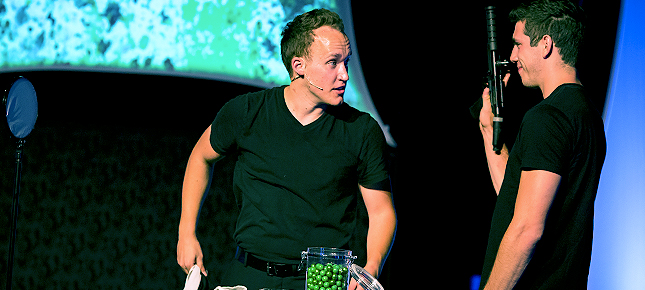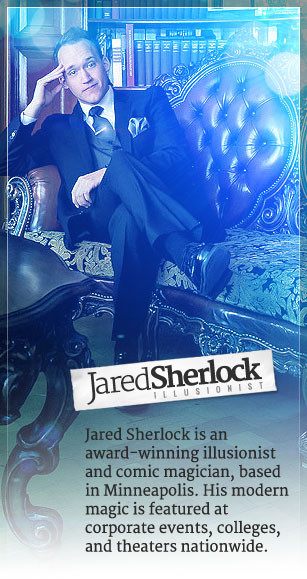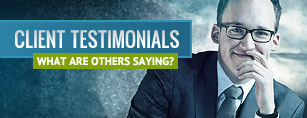A Trick Too Dangerous: Sandy Hook Elementary
“Before I go, I would like to share with you a trick so dangerous that the late
Harry Houdini himself would not even perform it… stopping the bullets!”
Last year I closed 109 performances with those exact words. I estimate that I have
performed this trick over 300 times. The carefully scripted words are in a
constant state of readiness, primed for delivery.

The trick is a contemporary (and safer) version of the infamous bullet catch
using a paintball gun. The effect’s ability to charge an audience with excitement
and anticipation is unmatched in my repertoire. Unless I am performing for a
group of children, my show always culminates with the paintball catch. One
hour before a corporate show in Fremont, Nebraska on Saturday, December 15,
2012, with the gun and paintballs neatly arranged onstage, I made the decision
to cut it.
Abbott Vaughn Meader was an American comedian who exploded into popularity
with the release of the album, The First Family, which expertly spoofed John F.
Kennedy. Listening to old variety performers “cutting up jackpots” (carny slang
for swapping stories), I have always been intrigued by tales of tragic world
events negatively impacting an entertainer’s show, and occasionally, their career.
When President Kennedy was killed on November 22, 1963, our country went
into mourning, and a wildly popular Vaughn Meader plummeted into obscurity.
The assassin’s bullet killed Kennedy, and Meader’s career. At a nightclub, just
hours after Kennedy’s death, standup comedian Lenny Bruce walked onstage
and joked, after a very long pause, “Man, poor Vaughn Meader.” The joke was
prophetic; Meader’s act was no longer in demand.
Thirty-six hours before my show, on a quiet Friday morning in December of
2012, tragedy surprised our country again when Sandy Hook Elementary school
in Newtown, Connecticut experienced one of the most horrific school shootings
in history. The solitary environments of my Minneapolis apartment and my car
provided only a few human interactions from the time of the tragedy, to the time
of my show in Nebraska the next night; a couple of gas stations and a Panera
Bread were my only stops. On site, I inserted the Co2 cartridge into the rear
housing of the pistol and warned the banquet hall staff that I was going to test
fire the gun.
POP! The vibrations from the gun’s recoil resonate in my hand, the shoulders of
the warned female server shoot up, and anxiety surges through me. At once, I
am acutely aware of my dangerous situation. My opening lines throb in my
head, “a trick so dangerous the late Harry Houdini himself would not even
perform it.” Is this trick now too dangerous for me, I question? Overnight, as we
did on November 23, 1963, the country went into mourning. The toy gun that
brought a cheering crowd to their feet just a few days earlier, now silently
threatened to ruin a company’s Christmas party, opening wounds that had not
yet had a chance to heal. As the employees and guests of my client arrived, and
their sincere Midwestern words filled the air, the danger was palpable.
As I arrived at the end of my set, fighting my instincts to begin reciting the
script, I spoke from my heart:
“I came prepared with an illusion that involves a gun. In deference to the
tragedy in Connecticut, I am reluctant to perform this illusion. Although it is
daring, magical, and funny, I feel it may be offensive given recent events. I’ve
never been in this situation,” I admitted honestly. “If just one person feels
uncomfortable, I will not perform.” Heads were nodding in agreement. “My
heart goes to the families and the children in Newtown, Connecticut.” A moment
of tense silence followed.
The simplest expectation of a private party audience is that you will make them
laugh. Hired as a luxury, not a necessity, my words may have had no place in
the evening’s festivities. The brief moment of silence that followed my words
confirmed my suspicion that the room’s response would not be unanimously in
agreement with me. But my announcement that I would be donating a portion
of my fee to the Sandy Hook Elementary relief fund on behalf of their company
provoked some reassuring applause. This was the best I could hope for.
Vaughn Meader was traveling on an airplane to a performance in Milwaukee
when Kennedy was assassinated. The news of Kennedy’s death greeted Meader
as he stepped off the jet bridge. He never left the airport, never contacted the
theater, and quietly purchased a returning ticket and was on his way home
within a couple of hours. As I drove home from Nebraska the following morning
reflecting on my decisions to address the issue, and subsequently lower the
show’s production value for my client, a small and empathetic smile formed on
my face as I realized my shared experience with the late Abbott Von Meader.
Great art and entertainment can force the world’s heavy burdens to recede.
People see theater to be jarred out of the real world; to laugh, to cry, and to be
amazed. But certain tragedies in history have incited pain and distractions so
overwhelming that even the most exciting entertainment will fail to overcome the
emotions harbored by an audience. Certain tragedies need to be acknowledged.
My decision to ignore the script and acknowledge Newtown’s tragedy may have
been inappropriate, and possibly even self-destructive for a person paid to make
people feel good. But for the one employee who approached me after the
performance to thank me for my sensitivity, I believe I did exactly what they
paid me to do. I made her feel good, and that is enough for me.
Donations to The Sandy Hook Elementary School Victims Relief Fund can be
arranged on the following site: http://www.crowdrise.com/shsrelief



